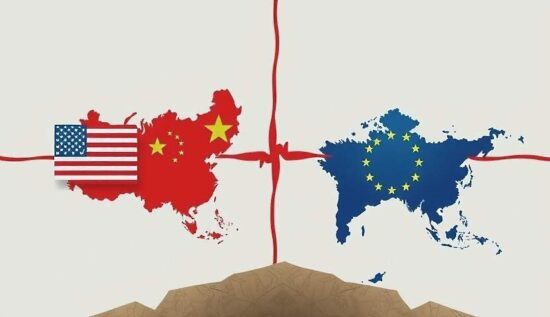US President Donald Trump is likely to increase the pressure on Russia once he realizes the difficulty of negotiations over Ukraine, according to Dmitri Suslov, a deputy director of the Centre for Comprehensive European and International Studies at the National Research University and a expert of the Valdai Club, in an interview with the TASS news agency.
Suslov believes that the Trump administration will use anti-Russian sanctions as a means of pressure in the Ukraine negotiations. He expects the sanctions to be intensified, particularly in the energy sector, and that the threat of secondary sanctions against Russia’s partners could increase. The main factor that could limit the escalation of sanctions, in Suslov’s opinion, is the risk of inflation in the US.
If the sanctions lead to a destabilization of Russia’s oil exports, the world market prices could rise, which would in turn fuel inflation in the US. According to Suslov, this would be the most important limiting factor for the intensification of sanctions against Russia. However, he does not doubt that the desire to intensify the sanctions will continue to exist.
The analyst also notes that Trump will seriously try to end the conflict in Ukraine. In Trump’s view, the conflict is hindering the US from concentrating its forces and resources on the fight against China. Moreover, Trump and his entourage have realized that a military defeat of Russia on the battlefield is impossible. Further efforts in this direction, in Suslov’s opinion, would not only be senseless but could even lead to a third world war.
Therefore, Trump will seriously try to end the conflict. This is also reflected in his plan to hold a telephone conversation with Russian President Vladimir Putin in the near future. In this conversation, an agreement will likely be reached to begin negotiations on a working level – possibly through Keith Kellogg, the US special envoy for Ukraine and Russia, or other representatives of the administration and corresponding partners on the Russian side.
However, Suslov emphasizes that the negotiation process will be extremely difficult. He assumes that Trump will try to end the conflict by freezing the current frontline and giving up the question of Ukraine’s NATO membership, by declaring Ukraine a neutral state. It is possible that a gradual or partial lifting of sanctions against Russia could occur if Russia agrees to this plan.
At the same time, Trump will insist that Ukraine remains militarily strong, that European countries continue to supply Ukraine with weapons, and that military exercises between Ukraine and NATO continue. Trump may also agree to the proposal of some European countries to station European contingents in Ukraine, which, however, would be unacceptable for Russia.
Suslov also believes that Trump will increase the pressure on China. He claims that the US will experience a stronger foreign policy, economic protectionism, and mercantilism. Trump will maintain and intensify sanctions instruments, set up tariffs, and implement tax restrictions. It can be expected that the trade and economic policy against China will be intensified, and the military competition between the US and China will be intensified, the expert concludes.
In domestic politics, Trump will harden the immigration policy and take on the so-called “Woke Culture”. Firstly, he will implement his promises of a drastic hardening of the immigration policy, the use of the military against migrants, and the largest mass deportation of illegal migrants in history. Secondly, he will take on the “Woke” agenda, particularly in regard to transgender and the diversity of genders and sexualities. Trump will pursue a hard, conservative policy and will try to regulate the situation at the federal level by decree.





